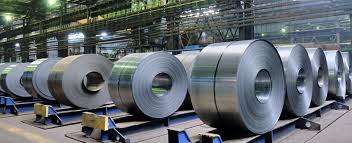
Suggesting that there would be no let-up for the beleaguered steel industry's plant closures and job losses across the globe, industry executives said that significant overcapacity will remain in China's steel sector even after planned restructuring.
As the UK foreign minister and a leading US steel executive added their voices to concerns about the recent surge in exports from China, there was acknowledgement by Chinese government officials and the country's steel association.
Planned cuts would reduce annual steel capacity to about 1.1 billion tonnes by 2020 while domestic consumption was unlikely to exceed 700 million tones, said Luo Tiejun, an official with China's industry ministry.
"We need to cut [an additional] 200 million tonnes for the situation to become acceptable," Mr Luo said. He also noted the about 100m tones of steel annually is currently exported by China.
The Chinese government is seeking to secure EU recognition as a "market economy" by the end of the year and the growing international controversy surrounding China's steel industry comes at an awkward time for the Chinese government.
The designation should be granted automatically under the terms of its 2001 World Trade Organisation accession agreement, argues Beijing. This designation, experts claim, would would make it harder to prove that Chinese steel plants were "dumping" their products overseas at below cost.
However after Tata Steel said it would dispose of a Welsh steel plant that employs 4,000 workers, there has been a backlash from European unions, industry and politicians for those EU officials who initially favored granting China market-economy status, or MES. Tata – the Indian group, has said that pressure was building on its European operations due to cheap Chinese exports.
At a meeting of the UK and Chinese foreign ministers, the crisis at Tata's Port Talbot facility in Wales came as even though trade disputes are seldom on the agenda of such meetings.
"I urged China to accelerate its efforts to reduce levels of steel production," Philip Hammond, UK foreign secretary, said after a meeting with his Chinese counterpart in Beijing.
As David Cameron's government attempts to cash in on its new status as Beijing's "best friend" in Europe, Mr Hammond also welcomed "potential interest" by Chinese companies in the UK steel sector.
In the US however the situation is somewhat different. In an election year during which the frontrunners for the Democratic and Republican parties' presidential nominations have threatened to roll back the Trans-Pacific Partnership and other free trade agreements backed by the Obama administration, it is highly unlikely that the US will agree to Beijing's demand for MES.
The head of the country's leading steel association said that "controlling steel output is more important" than cutting capacity adding further to the acknowledgement that China's planned capacity cuts will not be enough to quell the growing controversy.
A modest recovery in domestic steel prices this year had led to a "vicious circle" of rising costs and production, added Liu Zhenjiang, secretary general of the China Iron and Steel Association.
(Source: financialtimes.com)
As the UK foreign minister and a leading US steel executive added their voices to concerns about the recent surge in exports from China, there was acknowledgement by Chinese government officials and the country's steel association.
Planned cuts would reduce annual steel capacity to about 1.1 billion tonnes by 2020 while domestic consumption was unlikely to exceed 700 million tones, said Luo Tiejun, an official with China's industry ministry.
"We need to cut [an additional] 200 million tonnes for the situation to become acceptable," Mr Luo said. He also noted the about 100m tones of steel annually is currently exported by China.
The Chinese government is seeking to secure EU recognition as a "market economy" by the end of the year and the growing international controversy surrounding China's steel industry comes at an awkward time for the Chinese government.
The designation should be granted automatically under the terms of its 2001 World Trade Organisation accession agreement, argues Beijing. This designation, experts claim, would would make it harder to prove that Chinese steel plants were "dumping" their products overseas at below cost.
However after Tata Steel said it would dispose of a Welsh steel plant that employs 4,000 workers, there has been a backlash from European unions, industry and politicians for those EU officials who initially favored granting China market-economy status, or MES. Tata – the Indian group, has said that pressure was building on its European operations due to cheap Chinese exports.
At a meeting of the UK and Chinese foreign ministers, the crisis at Tata's Port Talbot facility in Wales came as even though trade disputes are seldom on the agenda of such meetings.
"I urged China to accelerate its efforts to reduce levels of steel production," Philip Hammond, UK foreign secretary, said after a meeting with his Chinese counterpart in Beijing.
As David Cameron's government attempts to cash in on its new status as Beijing's "best friend" in Europe, Mr Hammond also welcomed "potential interest" by Chinese companies in the UK steel sector.
In the US however the situation is somewhat different. In an election year during which the frontrunners for the Democratic and Republican parties' presidential nominations have threatened to roll back the Trans-Pacific Partnership and other free trade agreements backed by the Obama administration, it is highly unlikely that the US will agree to Beijing's demand for MES.
The head of the country's leading steel association said that "controlling steel output is more important" than cutting capacity adding further to the acknowledgement that China's planned capacity cuts will not be enough to quell the growing controversy.
A modest recovery in domestic steel prices this year had led to a "vicious circle" of rising costs and production, added Liu Zhenjiang, secretary general of the China Iron and Steel Association.
(Source: financialtimes.com)





